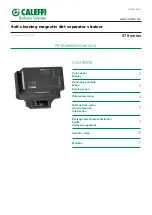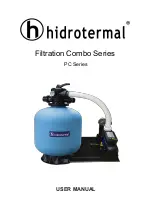
3
Menu
To access the various menus and submenus, hold the confirm/ok button for more than 3 seconds. To navigate among the various submenus, use
the “UP” or “DOWN” keys. Press the “BACK” key to return to the previous submenu and then press it again to return to the main menu, or wait 2
minutes without pressing any keys.
Press "OK" to enter the selected menus.
1. Forcing Menu
1.1 Alarms reset
Use the “UP” or “DOWN" keys and select “ON” to reset the active alarms and faults. Select “OFF” to quit without performing any operations.
The alarms and faults will not be cleared from the historic record.
1.2 Cleaning
Use the “UP” or “DOWN" keys and select “ON” to clean the strainer immediately. Select “OFF” to quit without performing any operations. Forcing
is possible only if the device is not performing any other operations (with yellow LED off). E.g. initial filling or sensors check.
1.3 Initial cleaning
Use the “UP” or “DOWN" keys and select “ON” for initial cleaning of the strainer. Select “OFF” to quit without performing any operations.
This function can be used to wash the system using the medium contained in the system. This avoids the need to drain large quantities of
medium and the related need for complicated air bleeding operations. When the set differential is reached a strainer cleaning cycle is triggered
immediately. The system quits the initial cleaning function as soon as the set time period has elapsed. When this function is active the green
LED will flash. To disable the function in advance, select "OFF". The function is not disabled when the device is reset.
1.4 Supply of additives
Use the “UP” or “DOWN" keys and select “ON” to start the additives supply procedure. Select “OFF” to quit without performing any operations.
Additives can be added to the system medium by means of the appropriate function. In this case the system is set to standby, after having
performed a forced cleaning cycle, with the aim of reducing the use of mains water as far as possible, taking advantage of tank emptying.
During the standby phase the necessary additives can be supplied to the device using the 1” cap located in the upper part of the strainer, see
the typical components drawing. Carefully check that the cap offers a hermetic seal, in order to prevent leakage or flooding. This phase is
composed of the following operations:
- closing of inlet V1
- emptying (opening of valve V3)
- strainers cleaning by starting motor M and opening valve V2
- closing of emptying valve V3
- wait confirmation from menu
- filling via V2 or with opening of V1. To confirm, press the “back” button followed by “OK” as shown on the display.
- opening of inlet V1
During the standby phase you can supply the necessary additives to the device.
1.5 Automatic checks
Use the “UP” or “DOWN” keys to select the submenu. The regulator performs a periodic check on operation of the various strainer functions.
This procedure can be carried out manually through the item on the regulator menu.
1.5.1 Sensors control menu
Use the “UP” or “DOWN” keys and select “ON” for immediate start-up of the procedure for checking correct operation of the Pressure and
Temperature sensors. Select “OFF” to quit without performing any operations.
1.5.2 Automatic offset menu
Use the “UP” or “DOWN” keys and select “ON” to set automatic/manual correction of sensor pressure values. This is normally carried out
in the factory but the values can be corrected automatically or manually. Select “OFF” to perform manual pressure correction (expert users
only). These checks are performed during the cleaning cycle or additives supply cycle.
1.6 Manual Commands (forcing)
Use the “UP” or “DOWN” keys and select the submenu by means of the “ON” key. Selecting the various items makes it possible to force
operation of the strainer motor and valves. For safety reasons, forcing is possible only if the device is in normal filtration status, hence it is not
performing sensors cleaning or checking operations.
1.6.1 Motor command menu
Use the “UP” or “DOWN” keys and select “ON” to start forced rotation of the motor. Select “OFF” to stop and "AUTO" to leave
control duties to the management controller.
1.6.2 Inlet valve manual command menu
Use the “UP” or “DOWN” keys and select “ON” to force opening of inlet valve V1. Select “OFF” to close and "AUTO" to leave control duties
to the management controller.
1.6.3 Drain valve manual command menu
Use the “UP” or “DOWN” keys and select “ON” to force opening of drain valve V3. Select “OFF” to close and "AUTO" to leave control duties
to the management controller.
1.6.4 Domestic water inlet valve manual command menu
Use the “UP” or “DOWN” keys and select “ON” to force opening of domestic water inlet valve V2. Select “OFF” to close and "AUTO" to leave
control duties to the management controller.
1.6.5 Drain cooling valve manual command menu
Use the “UP” or “DOWN” keys and select “ON” to request opening of the external valve. Select “OFF” to close and "AUTO" to leave control
duties to the management controller.
1.7 Sleep forcing menu
Use the “UP” or “DOWN” keys and select “ON” to force the system to sleep status. Select “OFF” to quit without performing any operations. The
sleep mode temporarily deactivates the device, setting it to standby status, with the valve V1 closing and without any control on the operation.
This status allows the device to be disabled for a set time, for example when the system is shut down in the summer. At the end of the sleep
phase the device will resume its normal operation. All valves are closed and de-energised in sleep status.
Summary of Contents for DIRTMAGCLEAN 579 Series
Page 14: ...14...
































